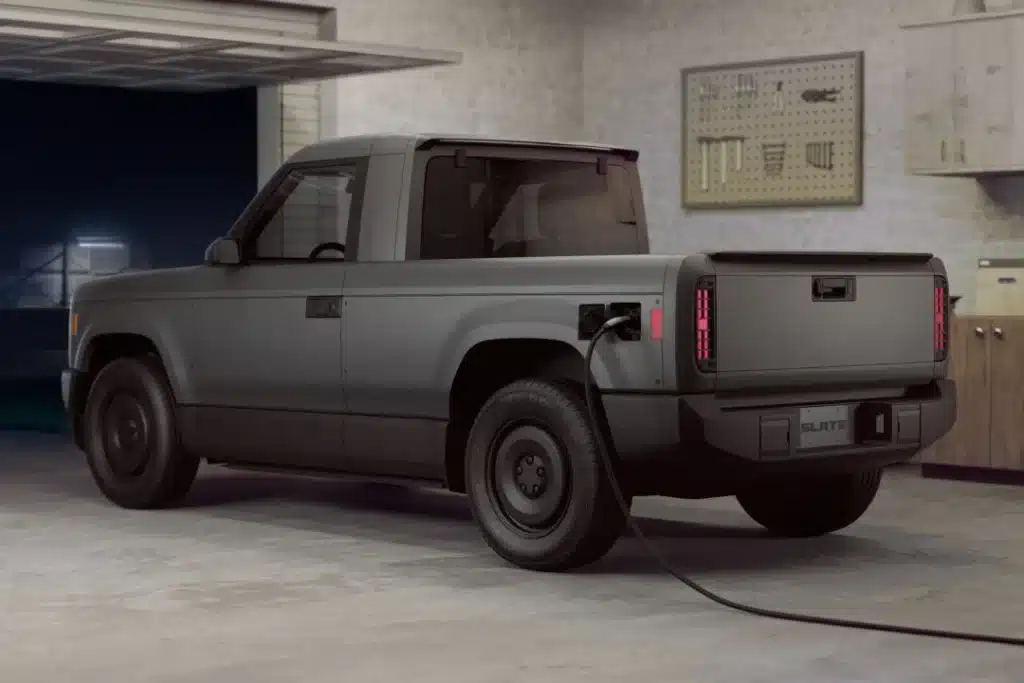Slate Auto CEO Reveals Plan Behind $25k EV Pickup Truck
With the average cost of a new car now edging closer to $50,000, the dream of affordable transportation is slipping away for many Americans. Basic, reliable vehicles—the kind that simply get you from point A to point B without a hefty price tag—have become increasingly rare in today’s auto market, especially as automakers push high-tech, high-priced models onto consumers.
Slate Auto, a new Michigan-based electric vehicle (EV) startup backed by Jeff Bezos, is setting out to rewrite the rules. Slate’s first product, an electric pickup truck starting at $25,000—and potentially less than $20,000 with federal EV tax credits—could be exactly the antidote America’s car buyers are desperately seeking. CEO Chris Barman, a veteran of Fiat-Chrysler (FCA), believes Slate’s approach could fill a gaping hole left by both traditional automakers and electric disruptors.
On April 27, 2025, Business Insider released an interview with Barman, who said, “There’s a massive population of people out there when it comes to safe, reliable, affordable transportation; there just really aren’t many alternatives for them.” She’s absolutely right—and Slate’s truck might be the first real, tangible solution.

Crushing EV Costs
The average price of an electric vehicle in the U.S. today is $59,000. Electric pickups? Even worse—vehicles like the Ford F-150 Lightning and Rivian R1T regularly top $100,000 for higher-trim models. For everyday Americans, even the idea of owning an EV feels more like a fantasy than a feasible option.
Slate’s offering is a radical departure from this trend. Their base truck, priced at $25,000, will come standard with 150 miles of range—more than enough for the vast majority of daily driving needs. No frills, no unnecessary tech add-ons that drive the price sky-high. Just basic, reliable transportation in an electric package. If Slate can pull this off, it will achieve what no other EV company has managed so far.
One of Slate’s most refreshing ideas is their focus on simplicity and modularity. Their base truck is designed to be what they call a “blank slate”—a bare-bones vehicle that gives buyers the freedom to add features as they go, based on their budget and needs.
At launch, the truck will feature manual crank windows, no radio, and other basic features you might associate with vehicles from decades ago. But unlike traditional models, Slate’s vehicle is designed to evolve with its owner. Over time, owners can upgrade almost everything—adding power windows, infotainment systems, or even transforming the pickup into a five-passenger SUV with a special kit.
“It gives freedom of choice to the owner of what accessories they would want to put on the vehicle, either at the time of purchase or over time, depending on their budget,” Barman said.
This approach is a complete paradigm shift in the way Americans think about car ownership. Instead of trading in a vehicle every few years for a new model, buyers can invest once in a vehicle that grows with them over time. It’s smarter financially, better for the environment, and gives owners a much greater sense of agency over their vehicles.

A New Way to Build — and Sell — Cars
Slate isn’t just innovating in the design of its vehicles; it’s rethinking the entire ownership experience.
Since Slate plans to sell vehicles directly to consumers—bypassing traditional dealership networks—it doesn’t have to sustain a web of service departments. That frees Slate to encourage DIY upgrades in a way no other major automaker would dare. In fact, Slate is launching “Slate University,” an online series of instructional videos that will walk owners through everything from installing power windows to adding rear seats and airbags for the SUV conversion.
For those less inclined to DIY, Slate also plans to partner with local facilities that can perform upgrades professionally, creating a hybrid model of service that supports different kinds of buyers.
This dual model is brilliant. It keeps initial costs low, supports personal empowerment, and still leaves room for professional service when needed—without inflating costs for everyone.
Built to Evolve With You
One of the most exciting aspects of Slate’s vision is how it sees the vehicle as a platform, not just a finished product. You might buy the base model as a young, single adult with limited income. A few years down the line, after getting married or starting a family, instead of trading in for a completely different vehicle, you simply upgrade your existing Slate truck.
The SUV kit, which includes rear seats, a roll cage, and even additional airbags, lets you convert your truck into a family-friendly SUV at a fraction of the cost of buying a new car.
“It may be, they were single when they first purchased the truck, and they recently got married, and a few years later, they have a family, and instead of having to exchange it out for a completely new vehicle, they can convert it into a five-passenger SUV and continue to use the vehicle,” Barman explained.
This level of flexibility is absolutely unheard of in the automotive world—and it couldn’t come at a better time. With interest rates still high, prices rising across the board due to economically disastrous and unnecessary tariffs, and household budgets stretched thin, the idea of investing once and adapting over time is incredibly appealing.

When Can You Get One?
Slate plans to begin customer deliveries at the end of 2026, with production taking place at a yet-to-be-announced facility somewhere in the Midwest. Reservations are already open, requiring just a refundable $50 deposit.
Given the hype—and the desperate need for affordable EVs—it’s a safe bet that Slate will have a very full order book well before production ramps up.
The Big Picture: Why Slate’s Mission Matters
Beyond the specs and the price tag, Slate’s mission is about something bigger: restoring freedom and mobility to a growing segment of Americans who feel increasingly priced out of the modern car market.
Chris Barman, who grew up on a farm and fondly remembers driving an old 1984 Ford Ranger with manual everything, understands firsthand the importance of basic, reliable vehicles. She brings a refreshing dose of practicality and empathy to a tech-heavy industry often obsessed with luxury features and sky-high margins.
As vehicles become ever more complex and expensive, Slate’s focus on affordable, upgradeable, and owner-friendly EVs feels almost revolutionary. It’s a throwback to a time when cars were simpler, yes—but it’s also a leap forward into a future where electric vehicles are truly for everyone, not just for the wealthy few.
If Slate can deliver on its promises, it won’t just be selling trucks. It will be reviving the American dream of car ownership—and helping reshape the future of electric mobility in the process.
EVinfo.net’s Take
Slate is super exciting for many reasons, but it’s low cost will be the most game-changing of all. Already high vehicle prices, for powertrains of all types, are discouraging buyers.
Now more than ever, America needs cheaper vehicles. Slate’s stripped down, customizable and upgradable platform is exactly what is needed right now.
EV prices in America are still higher than gas-powered counterparts. With this entry, Slate will compete with gas-powered models on price. Furthermore, no gas powered model currently has, or is reported to be planning to have Slate’s multitude of upgradeable, customizable features. The ability to convert a two seater truck to five-seat SUV is revolutionary, and the many benefits of this exciting vehicle are astounding.
Slate will likely be the push America needs to finally enter mass EV adoption, far behind the rest of the world in that regard right now.

Electric Vehicle Marketing Consultant, Writer and Editor. Publisher EVinfo.net.
Services